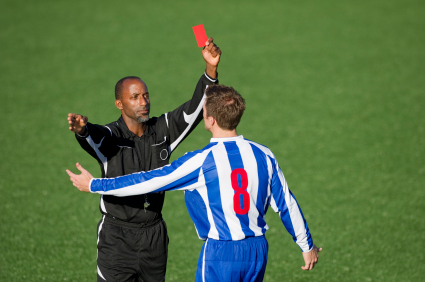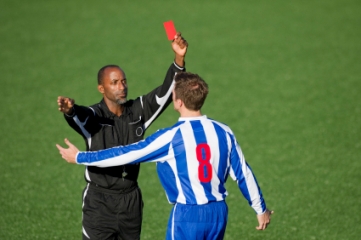

The tragic death of Utah soccer official Ricardo Portillo earlier this month after allegedly being punched in the head by a player to whom he had just shown a yellow card is an incident that has received significant national publicity, as well it should have. Sadly, it's just one of the low points in a youth sports culture that has become increasingly unsportsmanlike.

We have likely seen enough stories to have a sense that our youth sports culture has a sportsmanship problem. We have all heard about out-of-control parents, and leagues that have Silent Saturdays to force spectators to simply watch without their verbal ugliness intruding on the children's enjoyment.
But those stories don't convey some of the more brutal manifestations of poor sportsmanship that have been become so commonplace that they don't ever make into the local paper, much less to cable television.
It isn't just verbal attacks that plague our sports culture. There's substantial physical violence, and a lot of it is directed at sports officials.
How bad is it?
These reports, of course, are just the tip of the iceberg; they're the worst of the hundreds of monthly pushes, threats, bumps, and other acts committed against youth officials.
Yes, there is an epidemic of violence against sports officials.
Of course, these are just anecdotal reports. We don't know how widespread the problem is, but what little survey data there is - much of pretty hold, unfortunately - suggests that it is serious problem. A 1998 survey of Ohio high school officials by David Rainey and Peter Duggan (1) found that 13.6% had been assaulted at least once while officiating. When I surveyed San Francisco high school basketball officials in 2001, I found that 39.6% of them had been attacked at some point in their career. Most of these attacks occurred at youth contests or during adult recreational games. Only 10.4% of officials had been attacked at high school games - a number very close to the survey results by Rainey and Duggan. While I don't know of any more recent statistics, nothing in my experience suggests that the problem is getting any better.
The anecdotal information and the few studies that are out there tell us three things.
First, officials are attacked a lot.
Second, officials are threatened a lot.
Third, the more training coaches and officials have, the less likely officials will become victims of verbal or physical assault; thus, formal high school games are safer for officials than less formal youth contests and adult recreational games.
It is important to note that neither Rainey and Duggan nor I asked officials how they felt about the conditions in which they work. However, I believe that it is safe to say that most officials, in ordinary circumstances, don't feel as if they're at-risk. That doesn't mean, however, that they ever take their safety for granted; a wise official is always on guard and ever vigilant, and cultivates habits designed to reduce their chances of becoming victims of fan or player violence, because a normal setting can become dangerous very quickly. The casual observer may never realize that safety is behind some things officials do, but, believe me, if you ever wonder why basketball officials sprint off the court at the end of high school and college games, know that their sprint to the dressing room has its roots in a concern for their own safety.
Quite predictably, officials react to the environment that they face by seeking greater protection. The National Association of Sports Officials has done a good job by taking the lead in getting some states to pass laws criminalizing batteries (what the law calls a physical attack, but what most non-lawyers think of as an assault) committed against sports officials. The number of states with such legislation stands at 23, but may well increase in the aftermath of the Portillo tragedy. [For a listing of the states with such legislation, click here [2].]
But sports officials' battery legislation is not a cure-all (after all, it is illegal to attack or threaten any person, not just game officials). Sports officials' battery legislation have value, however, if for no other reason than that they send a message to police and prosecutors that officials are a class that needs special protection, to drive the message home that society does not tolerate physical abuse of the men and women who officiate athletic contests, and to emphasize that, rather than being a "confrontation" between an official and an angry coach, or player or fan in which the official is a participant, the official who is pushed, punched, or thrown to the ground is a victim of a criminal act. In some cases, of course, like that involving Ricardo Portillo in Utah, there is very little doubt that he was the victim. Prosecutors don't need a special law to seek to hold the person who allegedly attacked Ricardo Portillo criminally responsible for his actions.
Law or no law, the ultimate question is what can your child's youth, recreational, and high school league do to create a safer environment for game officials?
Here are a few suggestions:
I hate to say it, but it's just a matter of time before something ugly happens to an official again. But active management, setting program expectations, and having the courage to back up those expectations can help your child's program reduce the likelihood of ugly things happening. Ultimately, that's the best that anybody can ask for.
1. Rainey D, Duggan P. Assaults on Basketball Referees: A Statewide Survey. J Sport Behavior 1998;4:113.
Don Collins is an attorney, longtime basketball referee, and Commissioner of Athletics for the California Interscholastic Federation, San Francisco Section. The author of numerous articles on sports administration, sports officiating, legal issues affecting sports officials, and sportsmanship, Mr. Collins has also helped draft legislation to give sports officials independent contractor status and criminalizing assaults and batteries on officials.
Posted May 13, 2013

Links:
[1] https://momsteam.com/team-of-experts/donald-collins-jd/bad-acts
[2] http://www.naso.org/Resources/Legislation/StateLegislation.aspx
[3] https://momsteam.com/team-parents/coaching/general/survey-finds-spectator-abuse-major-cause-of-referee-shortage
[4] https://momsteam.com/successful-parenting/game-day/developing-a-positive-relationship-with-youth-sport-officials
[5] https://momsteam.com/team-of-experts/keith-wilson-msw-d-div/performance-parenting/parents-and-youth-sport-officials-can-g